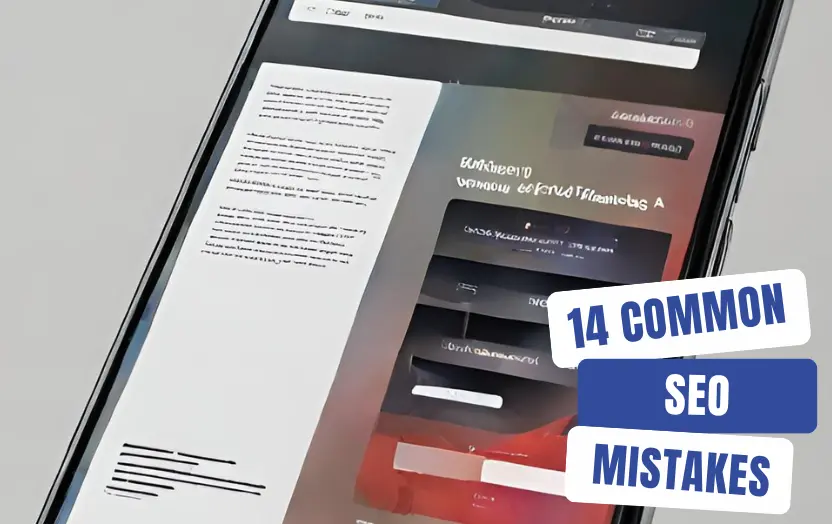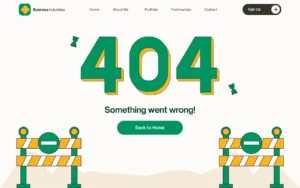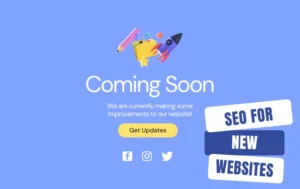
SEO Mistakes to Avoid

14 Common SEO Mistakes
SEO isn’t about “Quick Wins”, it’s about creating a valuable resource to support your customers in every step in the sales funnel, including aftercare. Avoiding common SEO mistakes is crucial for ensuring that your website performs well in search engine rankings and attracts organic traffic. Not everything in this list is something you can deal with yourself, you should always lean on experts who have the knowledge, skills, and tools to correctly identify the issues, create a strategic plan, and then deliver it. Most of these issues aren’t expensive to resolve but can be costly if done wrong.
Also, remember to measure everything, the objective isn’t to complete a task, it’s to improve something. There are tools available (for free in most cases) to help you set benchmarks, allowing you to revisit the same tools once the task is completed to check. Just make sure that you’re checking everything frequently so you know what “normal” and “good” look like, this way you’ll be able to spot issues easily.
Here are some prevalent SEO mistakes people often make with their websites:
- Ignoring Mobile Optimisation: With the increasing use of mobile devices, having a mobile-friendly website is essential. Neglecting mobile optimization can result in a poor user experience and lower search engine rankings. For example:
- That button that’s in a prominent place on your desktop screen, on a smaller screen is going to get stacked and pushed down.
- Those images you’ve sent over won’t scale down well for mobile screens, and they’ll either cut bits out or scale exactly and be tiny.
- Have all of your fonts been checked on small screens? The line heights? What happens if i suddenly put the word “Incomprehensibility” in as a H1, does it still work?
- Neglecting Page Speed: Slow-loading pages can negatively impact both user experience and SEO. Search engines prioritize fast-loading websites, so optimizing your site’s speed is crucial for better rankings. Go to Google’s page speed index tool, (use a Chrome browser and then open an incognito window first) then drop in your pages to test. Not just your home page, try your most valuable pages!
- Ignoring Keyword Research: Failing to conduct thorough keyword research can lead to ineffective targeting. Identify relevant keywords for your business and create content that aligns with user search intent. When you see that you’re ranking for the keyword you wanted, check the right page is ranking for it and not one of your blogs.
- Overlooking Title Tags and Meta Descriptions: Title tags and meta descriptions are essential for search engine visibility. Failing to optimize them or using duplicate content can hinder your site’s click-through rates and rankings. This is so simple, don’t just use these as SEO tools, use them to stand out, and talk to your customers. It’s easy to optimise for your target keywords, but how do you get your listing to stand out? Check in Search Console and measure against your Click-through rates to make sure you’re making positive changes.
- Lack of Quality Content: Content is a key factor in SEO success. Thin, irrelevant, or duplicated content can harm your rankings. Focus on producing high-quality, valuable content that addresses the needs of your target audience. Ask yourself if you’ve done enough, have you answered everything, would you proudly share what you’ve created with people in your industry? If not, then you’ve more work to do.
- Ignoring Image Optimisation: Images contribute to a positive user experience, but neglecting their optimisation can lead to slow page loading. Use descriptive file names (lowercase, hyphon-seperated text[-], avoiding numbers) alt tags (giving clear text explaining the content of the image), and compress images for better performance. Speak to your developer about whether you should be using webp instead of jpg formats and whether should you be providing them with every image in multiple formats to make sure the images work on devices of all sizes.
- Not Utilizing Header Tags Properly: Header tags (H1, H2, H3, etc.) help structure your content, Consider the H1 the master title, then each H2 a subheading, which itself can contain several H3 subheadings, and so on. It’s a way to structure your content and signal its importance to search engines. Using them improperly or inconsistently can confuse search engines and affect your rankings.
- Inadequate Internal Linking: Internal links help search engines understand the hierarchy and relationship between different pages on your site. Neglecting internal linking can result in poor crawlability and indexing. This step can also allow high-value pages to share some of that value (usually obtained through backlinks) with other pages on your site.
- Ignoring Broken Links: Broken links can harm user experience and affect search engine rankings. Regularly check and fix broken links to maintain a smooth browsing experience for visitors.
- Neglecting Local SEO: For businesses with physical locations, ignoring local SEO practices is a common mistake. Optimize your website for local search terms, claim your Google My Business listing, encourage customer reviews, and use local business Schema on your site. If you want to ensure consistency, there are tools out there such as SEMrush’s local SEO local business listing management tool, where you can add all of the details of your business in one place for ease of management, it also then lets you see where you show up in Google listing results (The map) for a selection of keywords too.
- Not Monitoring Analytics: Failing to regularly review website analytics can prevent you from identifying what’s working and what needs improvement. Utilise tools like Google Analytics to track your site’s performance and adjust your strategy accordingly.
- Ignoring Technical SEO Issues: Technical SEO is vital for search engine crawlers to understand and index your site correctly. Common issues include broken redirects, 404 errors, and improper canonicalisation. We’d suggest using a tool to monitor the site for these, or using an SEO agency as this is something they’ll do in the background.
- Overlooking Social Media Signals: While social media signals are not direct ranking factors, they can contribute to your website’s visibility. Share your content on social platforms to increase its reach and potentially attract more links. Make sure to add links to your site (the footer is a good place) so search engines like Bing will link them to your business listing.
- Ignoring Backlink Quality: Focus on building high-quality, relevant backlinks rather than pursuing quantity. Low-quality or spammy backlinks can harm your site’s reputation and rankings. Do not directly buy back-links, instead work with a PR agency or Digital Outreach company to help you get relevant high-quality links that are targeting the correct audience themselves too.
By avoiding these common SEO mistakes, you can create a solid foundation for your website’s online visibility and success in search engine rankings. Regularly audit and update your SEO strategies to adapt to algorithm changes and industry best practices.

Are you looking for a marketing agency to partner with?
You might also like
Google and other search engines understand that there's a significant difference in what people want to find in search results based on how they search.
We explore key signs that your website might be in need of a refresh, going beyond surface-level issues.
Unlocking SEO Success for New Websites Congratulations on the launch of your new website! Now, let's ensure it catches the eye and ranks high on search engines. Search Engine Optimization (SEO) is your key to Read more...


